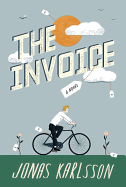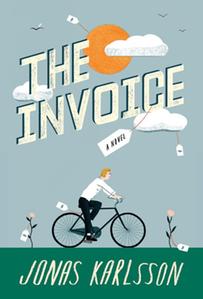
 The absurdities of life coupled with the strangely surreal are hallmarks of Swedish actor and playwright Jonas Karlsson's work. In his first novel, The Room, Karlsson set up a Kafkaesque scenario in which his protagonist Bjorn, an overly conscientious government bureaucrat discovers--on his way to the office toilet--a secret room. The presence of that room, and Bjorn's regular visits to it, a room only he can see and enter, changes his perception of himself and his coworkers--and vice versa. The story probes the nature of truth and how one defines life and work.
The absurdities of life coupled with the strangely surreal are hallmarks of Swedish actor and playwright Jonas Karlsson's work. In his first novel, The Room, Karlsson set up a Kafkaesque scenario in which his protagonist Bjorn, an overly conscientious government bureaucrat discovers--on his way to the office toilet--a secret room. The presence of that room, and Bjorn's regular visits to it, a room only he can see and enter, changes his perception of himself and his coworkers--and vice versa. The story probes the nature of truth and how one defines life and work.
Karlsson's second novel, The Invoice, again begins with an unlikely premise: a nameless, 39-year-old part-time video store clerk and film aficionado--a loner with only a handful of friends, whose most notable indulgence in life is having a pizza and taking in a movie in his one-room Stockholm apartment--receives a bill for 5.7 million kronor (roughly $875,000) in the mail. Thinking the bill--imprinted with a nondescript logo--is a mistake or a scam, the narrator disregards it. The next month, he receives another bill in the same amount, but with a surcharge of 150 kronor tacked on as a late payment. When the narrator calls to inquire, he makes matters worse as it is soon discovered that he owes even more than originally calculated. "What am I supposed to be paying for?" the narrator asks. "Everything," says the representative, Maud, a woman who, over time, becomes more empathetic toward the store clerk. "Being alive costs," she tells him. To which the narrator replies, "I had no idea it was so expensive."
Through a cryptic, engrossing storyline that snowballs with staggering, thought-provoking complications, Karlsson reveals more about his underachieving hero. The man becomes embroiled in red tape, psychological tests and meetings that pit him against an interrogative bureaucracy out to scrutinize and bill him, along with all of Swedish citizenry, for the "personal quantity of Experienced Happiness" in life. The narrator, who owns little of material value, admits, "I was undeservedly happy with my tranquil existence.... I couldn't really think of any injustice that had left any deep scars." He is ultimately forced to defend himself: "I haven't done anything at all with my life. Not a thing. I haven't traveled or studied or applied myself to anything." Therefore, it seems contradictory that the heftiest "happiness tax" in the whole country should be imposed upon someone living such a simple life. Fair or not, this leaves the narrator to scramble for deductions in the form of disclosures about free-floating anxiety, missing his parents and the loss of a secret love. The satirical, philosophical nature of this story--composed primarily as a monologue, interrupted by passages of dialogue--delves into the meaning and purpose of life, how we measure joy and what truly constitutes a sense of accomplishment. --Kathleen Gerard, blogger at Reading Between the Lines
Shelf Talker: A thought-provoking existential comedy about a lowly, Swedish video store clerk who receives an astronomical bill for simply living his life.

